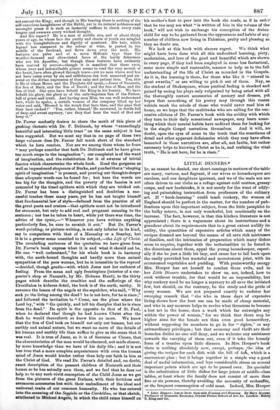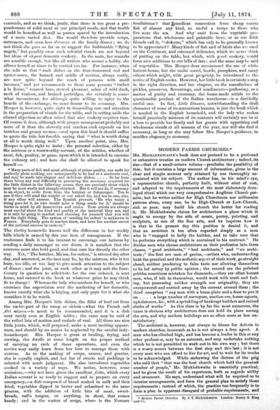LITTLE DINNERS.*
1w, as cannot be denied, our short-comings in matters of the table are many, various, and flagrant, if our wives or housekeepers are- careless, and our daughters ignorant, and we of the male sex are- often driven to our clubs as a refuge against cold mutton, greasy? soups, and raw beefsteaks, it is not surely for the want of edify- ing and painstaking instruction from professors of the culinary art. If "book-learning" could teach' cookery, the women. of England should be perfect in the matter; for the number of pub- lications upon this important subject, from the little pamphlet to the bulky octavo, is not only wonderful, but continually on the increase. The fact, however, is that this kitchen literature is not appreciated ; there is a vagueness about its instructions ancl ar grandeur about its requirements that to a great extent nullify its utility, the quantities of expensive articles which many of the- recipes demand are beyond the means of all save rich mistresses- of families, and the intricacies of preparation which many dishes• seem to require, together with the technicalities to be found in the directions about them, appal the young housekeeper, especi- ally if she be just a little bit lazy, and cause her to fall back upon the easily-provided but wasteful and monotonous- joint, with its - accustomed vegetables and pudding. With praiseworthy energy Mrs. Hooper has set herself to combat these evils, and in, her Little Dinners undertakes to show us, not, indeed, how to- cook without trouble, for that would be an impossibility, but why cookery need be no longer a mystery to all save the initiated few, but should, on the contrary, be the study and- the pride of every woman. We are not prepared exactly to endorse her sweeping remark that " she who in these days of expenaive- living shows how the best use can be made of cheap material, and •who in any measure helps to revive what threatens to become a lost art in the home, does a work which far outweighs any within the power of woman," for we think that there may be higher aims for the female sex than even good housewifery, without supposing its members to go in for " rights," or any extraordinary privileges ; but- that economy and thrift are their bounden duties no one will deny, and we welcome any assistance- towards the carrying of them out, even if it take the homely form of a treatise upon little dinners. In Mrs. Hooper's book there is nothing absolutely new, except, perhaps, the idea of giving the recipes for each dish with the bill of face, which is a convenient plan ; but it brings- together in a simple way a good deal of useful information, and lays considerable stress on several important points which are apt to be passed over. Its specialite is the substitution of little dishes for large joints at middle-class tables, at least where the family does not consist of- more than five or six persons, thereby avoiding the necessity of rechaufft5s, or the frequent consumption of cold meat. Indeed, Mrs. Hooper • Little Dinners : Sow to Serve theneseith Elegance and Economy. By Mary Doopen Professor of Domestic Economy, Crystal Palace School of Art, Ac. London : Eenrx S. King and Co.
contends, and as we think, justly, that there is too great a pre- ponderance of solid meat at our principal meals, and that health
would be benefited as well as purses spared by the introduction of a more varied diet. She would therefore provide soups, 'entremets, and even hors d'ceuvres at the family dinner ; we do not think she goes so far as to suggest the fashionable " flying angels," but possibly even such celestial viands are not beyond her ideas of elegant domestic cookery. In the main, her remarks
are sensible enough, but like all writers who mount a hobby, she allows herself at times to be carried too far. For instance, when she tells us that " such dishes as the time-honoured cod and oyster-sauce, the haunch and saddle of mutton, always costly, are now quite beyond the reach of persons with small incomes," and yet recommends to these same persons " turbot la Reine," roasted hare, stewed pheasant, salmi of wild duck, neck of venison, and braised partridges, she certainly is some- what inconsistent, for although quite willing to agree to the 'benefit of the exchange, we must demur to its economy. Mrs. Hooper is, however, quite right in demanding care and attention in the preparation of viands for the table, and in setting aside the absurd objection so often raised that nice cookery requires time. Of course it does, although with proper management probably not more of it than the slovenly and careless cook expends on her tasteless and greasy messes,—and upon this head it should suffice to quote the trite but forcible saying that " what is worth doing at all is worth doing well." Upon another point, also, Mrs. Hooper is quite right to insist ; the personal selection, either by the mistress or a trustworthy servant, of the articles, whether of meat, fish, poultry, or game, upon which it is intended to exercise
the culinary art ; and here she shall be allowed to speak for herself:— "Many parts of fish and meat, although of prime quality, are unfit for perfectly plain cooking, are consequently to be had at a moderate cost, and may be made into elegant and delicious dishes. . . . . So far from there being any real difficulty in procuring the morceaux required for the little dishes in the following menus, they are precisely those which may be most easily and cheaply obtained. But it will not do, if economy is an object, to order them from the butcher or fishmonger. Ten to one if they will send the weight or cut asked for, and ten to one, also, if any other will answer. The Spanish proverb, 'He who wants a thing goes for it, he who would miss a thing sends for it,' should be borne in mind by all housewives and cooks. True artists are always most careful about the kind and quality of the material they use, and it is only by going to market and choosing for yourself that you will get the right thing. The system of ' sending for orders' is unknown in France. Everybody goes to market there, and here lies another secret of the national success in cookery."
The thrifty housewife knows well the difference in her weekly bills which is caused by this one item of management. If the tradesman finds it to his interest to encourage our laziness by
sending a daily messenger to our doom, it is manifest that the converse must also hold good, and that ours lies directly the other way. Yet, "The butcher, Ma'am, for orders," is uttered day after day, and answered, as the case may be, by the mistress, who is too busy, too idle, or too lazy to give much attention to the subject
of dinner ; and the joint, or such other as it may suit the func- tionary in question to substitute for the one ordered, is sent -home, and entered in the book at whatever price he may think
-fit to charge ! Whereas the lady who markets for herself, or who
-exercises due supervision over the marketing of her domestic, knows exactly what she is buying, and only pays for it what she .considers it to be worth.
Among Mrs. Hooper's lttle dishes, the fillet of beef cut from the under-part of the rump or sirloin—what the French call ,filet mignon—is much to be recommended, and it is a dish very rarely seen at English tables ; the same may be said of the rolled loin of mutton and roulade of veal. All these are nice little joints, which, well prepared, make a most inviting appear- ance, and should by no means be neglected by the careful lady-
housekeeper. Mrs. Hooper is great at broiling, frying, and :stewing, she dwells at some length on the proper method of carrying on each of these operations, and even the novice may easily learn from her how to manage them with success. As to the making of soups, sauces, and gravies, she is equally explicit, and her list of sweets and puddings is selected with much judgment. She also introduces vegetables .cooked in a variety of ways. We notice, however, some
omissions,—why not have given the excellent fritto, which every Italian servant is so ready to suggest and to prepare on every emergency,—a dish composed of bread soaked in milk and then fried, vegetables dipped in batter and submitted to the same process, with the addition of little bits of meat, sweet- breads, calf's tongue, or anything, in short, that comes handy; and in the matter of soups, where is the Norman bouillabaisse? that Sexcellent concoction from cheap coarse fish of almost any kind, so useful a recipe to those who live near the sea. And why omit from the vegetable pre- parations that wholesome and palatable laver, or as our Irish friends call it, "slokaun," which has only to be generally known to be appreciated? Many kinds of fish and of birds also are used on the Continent, and esteemed delicacies, which we never think of putting on the table, but which, with good cookery, would form nice additions to our bills of fare ; and the same maybe said of vegetables. Mrs. Hooper does recommend the use of white haricot-beans, but she omits sorrel, lentils, pumpkins, and many others which might, with great propriety, be introduced to the notice of English cooks. However, her little book is certainly a step in the right direction, and her chapter, on the manufacture of pickles, preserves, flavourings, and condiments—preferring, as a matter of purity and economy, the home-made article to the questionable product of the Italian warehouse—is a decidedly useful one. In fact, Little Dinners, notwithstanding the droll character of some of its sententious lessons, is just the book which is needed in the English household, and the lady who makes herself practically mistress of its contents will certainly not be at a loss to provide her family and her guests with appetising and wholesome viands at all seasons of the year, nor will she find it necessary, so long as she may follow Mrs. Hooper's guidance, to sacrifice elegance to economy.



































 Previous page
Previous page